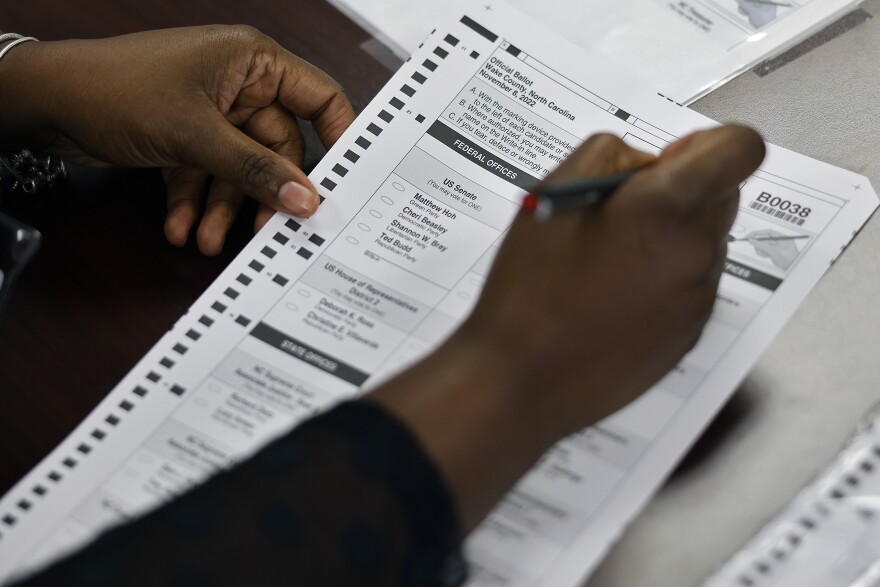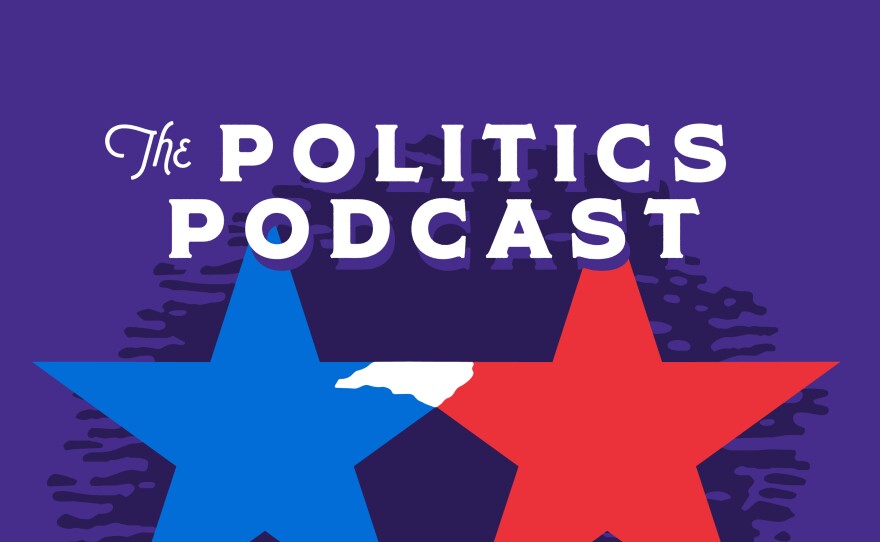Karen Brinson Bell took the hot seat last week, appearing before the House Oversight and Reform Committee at the North Carolina General Assembly.
While Republican lawmakers grilled Brinson Bell — the executive director of the North Carolina State Board of Elections since 2019 — on issues like same-day registration, voter list maintenance, and provisional ballots, she emphasized the need for adequate funding.
Brinson Bell appeared before the committee just as Republicans — who hold a veto-proof supermajority at the legislature — push for sweeping changes to the state's voting laws. Those changes would ratchet up the budgetary pressures on elections officials.
One bill would eliminate a three-day grace period for receiving mail-in ballots postmarked by Election Day, something that has been in place since 2009.
GOP ire over 2020 settlement is behind new elections bills
Republicans have been clear that part of the motivation for the new legislation is their continuing anger over a temporary rule change for the 2020 elections amid the COVID-19 pandemic.
Voting rights advocates had sued the state elections board to extend the grace period for mail-in ballots and to ease rules around the absentee-by-mail witness requirement. Brinson Bell and North Carolina Attorney General Josh Stein, a Democrat, settled the lawsuit.
"What, or who maybe, made you think you had the authority to do that?" Rep. Jeff McNeely, a Republican from Iredell County, asked Brinson Bell at the committee hearing.
After the settlement, Republicans accused Brinson Bell and Stein of colluding with Democratic interests behind the lawsuits and circumventing the legislative process.
Brinson Bell made it clear she was proceeding as authorized by the appointed bipartisan elections board.
"Two Republicans and three Democrats, they unanimously decided to settle with that lawsuit on three items," Brinson Bell said.
Funding — not fighting false claims of fraud — is big challenge for safe, secure elections
That settlement resulted in a six-day extension of the grace period for 2020 only. Another item in the settlement — a relaxation of the witness requirement on absentee-by-mail ballots — was struck down by a court that also upheld the grace period extension.
Brinson Bell also faced questions about provisional ballots, given to voters who show up to cast ballots but whose names cannot be reconciled with information in the poll books used by precinct officials.
Committee Chairman Jake Johnson, a Republican from western North Carolina, discussed the 266 instances statewide in 2022 where voters were given provisional ballots because of alleged double voting.
In a state that has more than 7 million registered voters, 84 of those provisional ballots ended up being rejected.
"That's actually a pretty good number," Brinson Bell said. "Considering that we had a 51% turnout in the 2022 general election."
She added to explain one common mistake: "I don't know how many at this panel are a junior or a senior, but that, I would say, is the most common issue that we have. Someone gets checked in under their father or their son's name and we have to correct that."
Brinson Bell cautioned committee members that the biggest threat to safe and secure elections in North Carolina is a lack of adequate funding.
Current proposed spending bills in the House and Senate fall far short of the requests from elections board staff. Brinson Bell's department is seeking $6.5 million dollars over two years to help with implementing voter identification.
The State Supreme Court recently reversed a decision from last year that had declared a mostly GOP-backed photo ID requirement for voters would have a discriminatory impact on Black voters. Elections officials need to notify voters of the requirement and make changes to the absentee-by-mail ballots, which go out starting Aug. 11.
And the elections board needs a $13.5 million capital investment to upgrade its almost 30-year-old State Election Information Management System, or SEIMS.
"It's how we process voter registration," Brinson Bell said, explaining the central importance of SEIMS. "It's how we do petition checking, it's how we provide election night results."
State elections board needs funding for staff to help counties
According to Brinson Bell, the state's elections agency needs funding for personnel — field workers that disperse to assist local elections officials — to help with understaffed and inexperienced county boards.
"Since 2019, we have had 49 changes in county directors," she told committee members.
For 30 of those new directors, 2024 will be their first time running elections in a presidential cycle year, Brinson Bell said.
Republicans in the state legislature have been citing polls that show declining faith and public trust in elections as they drive to alter North Carolina's voting laws.
But Brinson Bell challenged the accuracy of such assertions. She contended the best reflection of the state of public trust in North Carolina election is voter turnout.
"Trust to me is if you don't believe in the system, you won't use the system," Brinson Bell told the committee. "And we had 75% of our voters turn out in 2020, we had 51% turn out in 2022.
"These numbers are high, compared to other election years."

Lawmakers, public officials must not "amplify misinformation"
As for the best way to combat a decline in public trust, Brinson Bell implied it's the lawmakers themselves, and other public officials and political candidates who bear primary responsibility.
"You are regarded," Brinson Bell said to the committee members. "And when you can look at a voter and say, 'I know I was fairly elected and how that process works,' then that's a testament to the work that we do."
Brinson Bell said members of the public need to know of the many opportunities they have to observe and witness the painstaking elections process, from logic and accuracy testing of voting machines to sample hand-to-eye counting of ballots post-election.
"And then it's just making sure we don't amplify misinformation and I think we all have a responsibility to that," Brinson Bell said.
Another bill proposed by members of the legislature's Republican majority would restructure the elections board, making it an eight-member, bipartisan body appointed by lawmakers. Deadlocked votes over the appointment of an elections director would go to the legislature.



